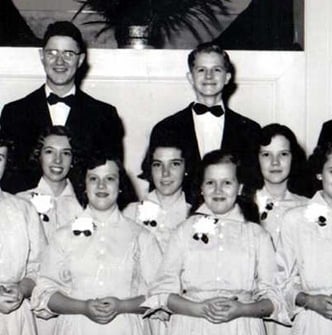 The reason I disagree with Al Mohler’s recent strong statement that clearly ties belief in the gospel to young earth creationism and denial of the gospel for those who believe in theistic evolution is not because I’m a scientist and know better but because evangelicalism has been bigger than that view for a long, long time.
The reason I disagree with Al Mohler’s recent strong statement that clearly ties belief in the gospel to young earth creationism and denial of the gospel for those who believe in theistic evolution is not because I’m a scientist and know better but because evangelicalism has been bigger than that view for a long, long time.
Mohler pushed Carl Henry, B.B. Warfield, John Stott, and William Lane Craig under the bus. Mohler is sadly mistaken on this one, and the reason he’s mistaken is because there is more than one evangelical reading of Genesis 1–2. Which is why..
Question:
In order to believe the gospel, what does a human need to believe about God and about humans?
How tied to the Creation Story of Genesis 1–3 is the gospel?
This is a misconception because there are a number of views of origins among evangelical Christians. There are a number of views about how God created. Perhaps some today will say those folks who have more evolution-compatible views are not evangelical. The critics have every right to do so, but they will go against the grain of evangelical history and some of the best thinking today among evangelicals.
Wilkens and Thorsen offer a number of helpful ideas…
Beginning with a thoughtful, nuanced comparison of evolutionism and Galileo’s denunciation by the Catholic Church. He sees three parallels: Galileo, so it was thought, decentralized humans in the plan and world of God; Galileo, so it was argued, denied the plain literal reading of the Bible; and Galileo was a minor voice in the larger scope of things. Yes, there are differences, but the similarities are not a little uncanny. (Agree?)
But Wilkens and Thorsen are too sensitive pastorally and theologically to suggest the Brights get this and the Dulls go along with young earth. They know human dignity and nature are at stake; they know one must respect the authority of Scripture. They know scientists think religion threatens genuine science at times; they know too that sometimes religion can be oppressive and suppressive.
Defining terms is so important, which is what Wilkens and Thorsen do: creationism refers to God creating but this term captures those who believe in a young earth or an old earth, and that means these folks think evolution is deeply mistaken. Day-age theorists think the “day” of Genesis 1 is an epoch, making an old, old, old earth possible — and I learned this first back in college from Bernard Ramm. Then there are theist evolutionists who think God used evolution — old, old, old earth — as the way he created and continues to create. And then there are radical evolutionists, material evolutionists and ontological evolutionists who think we are the result of random natural selection.
Evangelicals, and this is the major point of this chp, have
a variety of views when it comes to these issues but they don’t give in on the
dignity of humans, the image of God in humans, and the special creation – at some
level – of humans.
But they do differ on how to read Genesis 1–2, and John Walton’s recent book is an excellent example of some recent evangelical
variety.
They then propose a few paradigms:
Conflict: when science conflicts, chuck science; when the
Bible conflicts, chuck the Bible.
NOMA: non-overlapping magisterial paradigm. Science and
religion/Bible deal with two different dimensions of life.
Interactive: we must bring Bible and science into
interaction.
They know science can only do so much; it can’t talk purpose
and meaning. It can describe what it sees and can test.
 The reason I disagree with Al Mohler’s recent strong statement that clearly ties belief in the gospel to young earth creationism and denial of the gospel for those who believe in theistic evolution is not because I’m a scientist and know better but because evangelicalism has been bigger than that view for a long, long time.
The reason I disagree with Al Mohler’s recent strong statement that clearly ties belief in the gospel to young earth creationism and denial of the gospel for those who believe in theistic evolution is not because I’m a scientist and know better but because evangelicalism has been bigger than that view for a long, long time.
